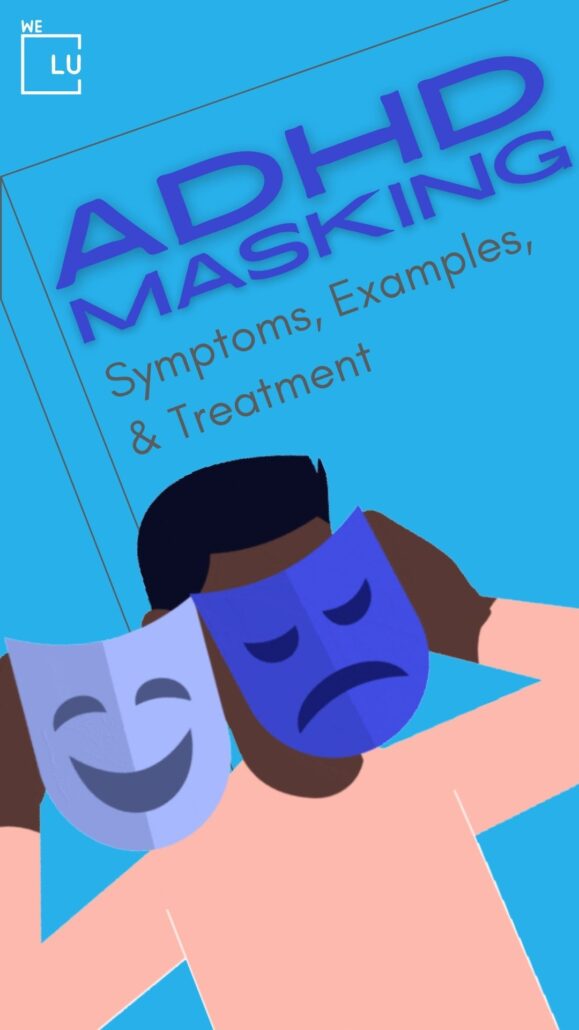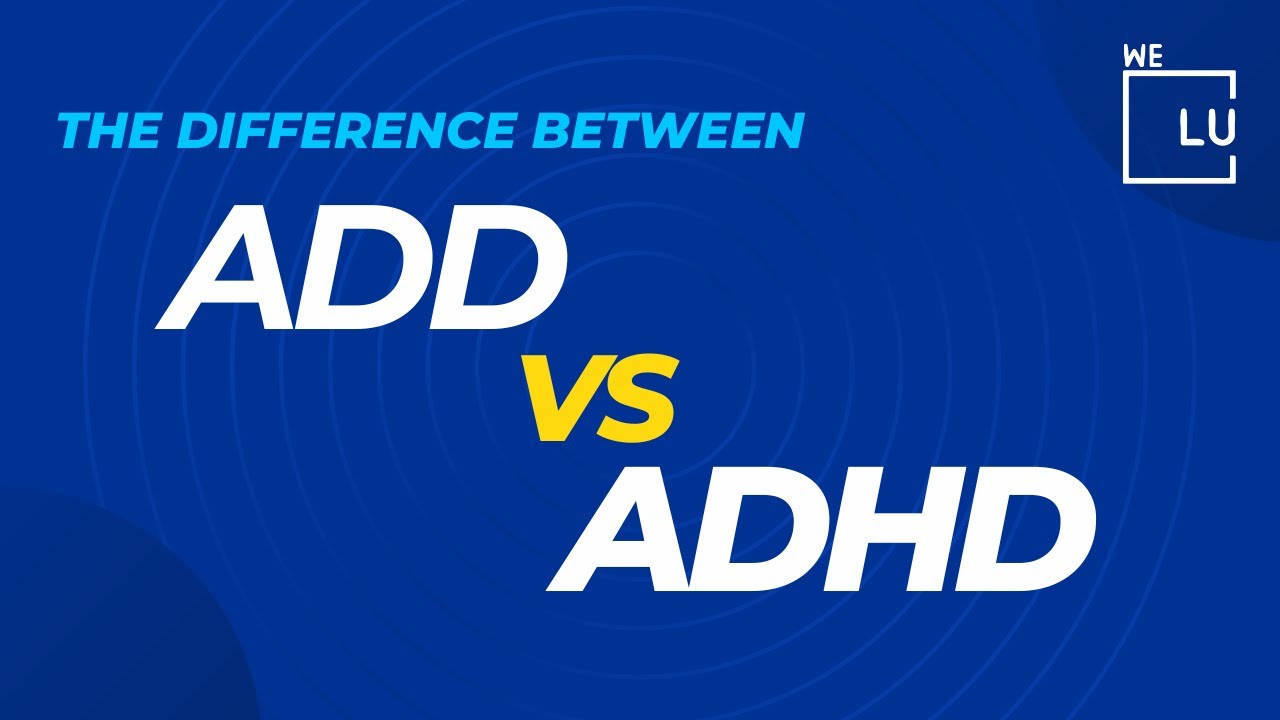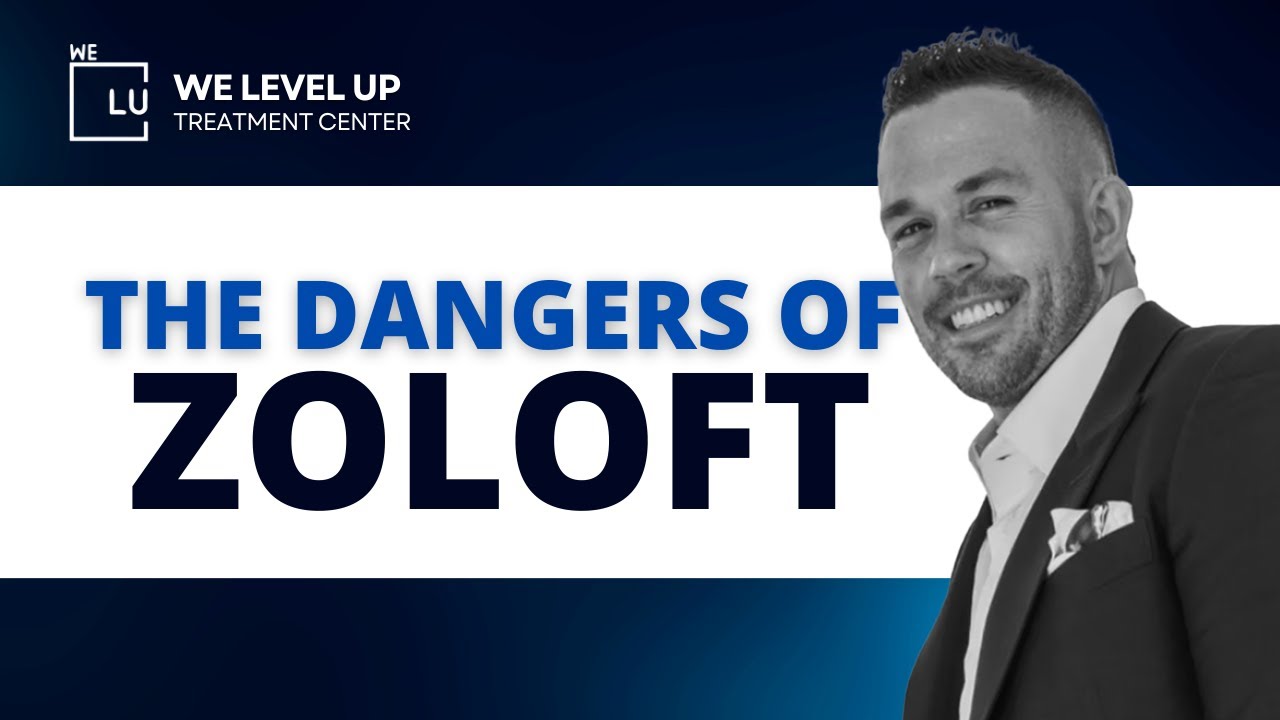What is Inattentive ADHD?
Individuals with inattentive ADHD face difficulties in focusing on details, frequently experience distractions and often find organizing tasks or completing them challenging. While there is no cure, a combination of medication and behavioral therapy can effectively manage symptoms associated with inattentive ADHD.
What are Inattentive ADHD Symptoms?
Symptoms of inattentive ADHD encompass challenges in focusing on details, being easily distracted, and struggling with organizational tasks. It’s common to forget routine responsibilities, like paying bills or returning calls.
If these symptoms significantly impact daily life, seeking professional evaluation for diagnosis and management is advisable. The symptoms include:
- Difficulty paying attention to details.
- Easy distractibility.
- Challenges with organization and task completion.
- Forgetfulness, especially regarding routine responsibilities.
- Difficulty sustaining attention in activities.
- Frequently making careless mistakes due to lack of attention.
- Avoidance or reluctance to engage in tasks that require sustained mental effort.
- Often misplacing items necessary for tasks.
- Forgetfulness in daily activities, such as keeping appointments or returning calls.
- Difficulty following through on instructions or completing assignments.
What Causes Inattentive ADHD?
The precise causes of ADHD are not definitively understood, but a strong familial tendency suggests a genetic and neurobiological connection. The primarily inattentive form of ADHD in adults typically originates during childhood or adolescence.
Additional risk factors for attention deficit hyperactivity disorder, predominantly inattentive type, encompass:
- Genetic Predisposition: A family history of ADHD heightens the likelihood of developing the condition.
- Neurological Factors: Variations in brain structure and function contribute to ADHD development.
- Environmental Influences: Exposure to toxins during pregnancy or early childhood may play a role.
- Premature Birth or Low Birth Weight: These factors are associated with an increased risk of developing ADHD, including the inattentive subtype.
- Brain Injury: Traumatic brain injuries or other neurological conditions can be linked to the onset of inattentive ADHD symptoms.
How are ADHD Inattentive Type Adults Diagnosed?
The diagnosis of predominantly inattentive ADHD type typically involves a comprehensive evaluation conducted by a healthcare professional. The assessment process includes:
- Clinical Interview: A detailed discussion covering the individual’s symptoms, medical history, and daily life challenges.
- Self-Reported Symptoms: Completion of questionnaires or self-assessment tools by adults to provide insights into their experiences.
- Observations and Reports: Gathering input from family members, friends, or colleagues to understand the individual’s behavior across various settings.
- Rule Out Other Conditions: Assessing for alternative explanations for the symptoms and ensuring that another mental health or medical condition does not better account for them.
- Diagnostic Criteria: The diagnosis adheres to specific criteria outlined in the DSM-5, involving persistent and impairing symptoms related to inattention.
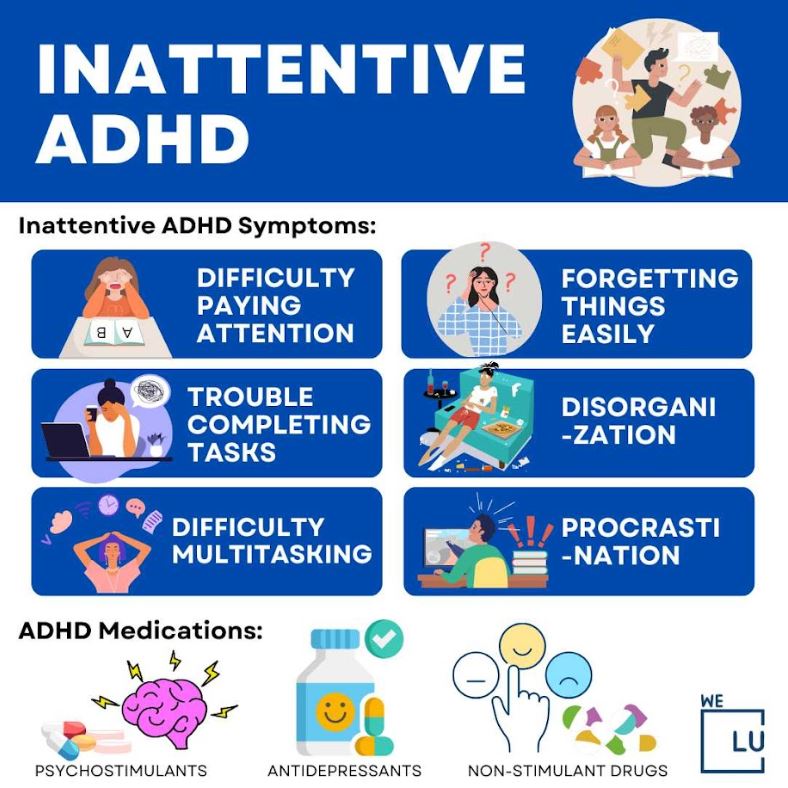
Learn about resources for ADHD counseling TODAY. Discover professional help from We Level Up Texas’ mental health therapists. Start getting support with a free call to our mental health hotline.
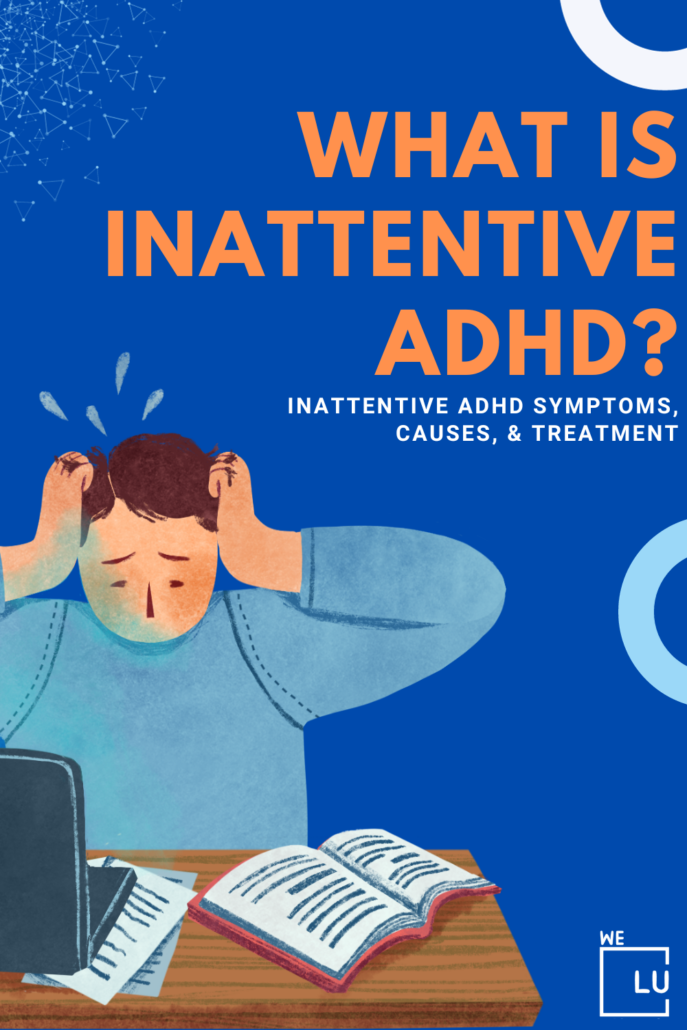
Skip To:
Learn More:
How Does Inattentive ADHD In Women & Men Differ?
Females with ADHD may perceive more substantial subjective impairment compared to males. A 2016 study from Sage Journals revealed that females with ADHD report more pronounced symptoms of inattention than their male counterparts. Additionally, males and females with ADHD exhibit distinct patterns of comorbidity, signifying the presence of other conditions alongside ADHD.
Males often receive an ADHD diagnosis earlier due to the noticeable hyperactive symptoms, which can be disruptive. On the other hand, females may not prominently display inattentive behavior, potentially leading to overlooked diagnoses. Inattentiveness in females might become more apparent in structured educational settings like college, potentially causing delays in diagnosis. Females may also develop effective coping strategies to compensate for ADHD-related challenges.
A 2018 study suggests that ADHD risk in females is more likely to be identified or diagnosed as anxiety or depression compared to males. Because ADHD symptoms are less overt in females, there is a tendency for experts to consider personality or internalizing disorders, contributing to delays in diagnosis and subsequent treatment.
Get Help. Get Better. Get Your Life Back.
Searching for Accredited Drug and Alcohol Rehab Centers Near You? We Level Up Texas Is Opening Soon!
Even if you have failed previously and relapsed, or are in the middle of a difficult crisis, we stand ready to support you. Our trusted behavioral health specialists will not give up on you. When you feel ready or just want someone to speak to about therapy alternatives to change your life call us. Even if we cannot assist you, we will lead you to wherever you can get support. There is no obligation. Call our network hotline today.
FREE Addiction Hotline – Call 24/7How is Inattentive ADHD Treated?
The treatment of inattentive ADHD typically involves a combination of tailored therapeutic approaches aimed at addressing specific symptoms and challenges. Common treatment strategies include:
- Behavioral Therapy: Techniques such as cognitive-behavioral therapy (CBT) can assist individuals in developing coping strategies, improving organizational skills, and addressing challenges related to inattention.
- Psychoeducation: Providing information about ADHD, its symptoms, and effective management strategies empowers individuals to better understand and cope with their condition.
- Medication: In some cases, stimulant medications like methylphenidate or non-stimulant prescriptions such as atomoxetine may be prescribed to help manage symptoms.
- Supportive Interventions: Creating a supportive environment at home, school, or work can contribute to managing ADHD.
- Structured Routines: Establishing consistent daily routines and breaking tasks into smaller, manageable steps can enhance organization and focus.
Individualized treatment plans are crucial, and healthcare professionals, often in collaboration with therapists or educators, can guide the selection of appropriate interventions based on the unique needs of individuals with inattentive ADHD.
Inattentive ADHD Behavioral Therapy
Behavioral therapy for inattentive ADHD involves targeted interventions designed to address specific behaviors associated with inattention. Critical components of behavioral therapy for inattentive ADHD may include:
- Skill Building: Teaching and reinforcing organizational and time-management skills to enhance daily functioning.
- Cognitive Strategies: Identifying and challenging negative thought patterns that may contribute to inattentiveness.
- Task Breakdown: Breaking tasks into smaller, more manageable steps to reduce feelings of overwhelm and facilitate completion.
- Reward Systems: Implementing a reward system to reinforce positive behaviors and task completion.
- Environmental Modifications: Creating an organized, conducive environment to minimize distractions and support focus.
- Goal Setting: Collaboratively setting realistic and achievable goals to track progress and maintain motivation.
Behavioral therapy aims to equip individuals with practical skills and strategies to enhance attention, organization, and overall functioning. The specific techniques employed may vary based on individual needs and preferences.
Inattentive ADHD Medication
Medication is sometimes prescribed to help manage symptoms of inattentive ADHD. Common medications include:
- Stimulants: Like methylphenidate or amphetamine-based medications, which can enhance neurotransmitter activity in the brain to improve focus and attention.
- Non-Stimulants: Atomoxetine is a non-stimulant medication that works on norepinephrine reuptake, providing an alternative for those who do not respond well to stimulants.
- Alpha-2 Agonists: Medications like guanfacine and clonidine may address symptoms by affecting certain neurotransmitters.
The choice of ADHD treatment and medications depends on various factors, including individual response, potential side effects, and any pre-existing health conditions.
Medication is often used in conjunction with behavioral therapy and other supportive interventions to create a comprehensive treatment approach tailored to the individual’s needs. Regular monitoring and adjustments are standard to ensure effectiveness and manage potential side effects.
It’s crucial to consult with a healthcare professional to determine the most appropriate medication and treatment plan for ADHD.
How To Cope With Inattentive ADHD and Manage the Day-to-Day Activities of Life?
To cope with inattentive ADHD and enhance daily task management, consider implementing the following strategies:
- Establish a Routine:
- Create a daily routine to provide structure and stability.
- Break down tasks into smaller, more manageable steps.
- Utilize Planning Tools:
- Use planners, either physical or digital, to organize tasks and deadlines.
- Set alarms or reminders for appointments and important dates.
- Manage Distractions:
- Request a quiet workspace or relocate to a less distracting environment.
- Use headphones with soft music to minimize external noise.
- Redirect calls to voicemail and return them during scheduled times.
- Enhance Organization:
- Dedicate time at the beginning of each day to organize tasks.
- Complete one task before moving on to the next.
- Maintain a to-do list on paper or a mobile device.
- Utilize Reminders:
- Set alarms for appointments and mark deadlines on visible calendars.
- Implement daily planners or online organizers to track tasks.
- Take Preventive Measures:
- Designate specific spots for commonly used items.
- Implement a filing system with labels or color-coded folders.
- Prevent Item Loss:
- Designate specific locations for essential items to prevent misplacement.
- Stay Focused:
- Take handwritten notes during meetings or use recording as a backup.
- Break down large tasks into smaller ones and reward yourself upon completion.
- Incorporate short breaks to prevent boredom, including walks, stretches, or water breaks.
Seeking help from mental health professionals and considering behavioral therapy can also empower individuals to manage the challenges associated with inattentive ADHD effectively.
We Level Up TX Mental Health Center Quick Tips To Deal With Inattentive ADHD
To effectively manage inattentive ADHD, adopt the following strategies:
- Establish a Structured Routine:
- Create a daily routine for a sense of structure and consistency.
- Break down tasks into smaller, more manageable steps to prevent overwhelm.
- Utilize Planning Tools:
- Employ planners and reminders to enhance organization.
- Focus on one task at a time to maintain concentration.
- Task Management:
- Prioritize tasks and allocate specific time slots for each.
- Use visual cues or alarms to stay on track and transition between activities.
- Professional Support:
- Seek assistance from mental health professionals for personalized guidance.
- Engage in psychoeducation to better understand and manage inattentive ADHD.
- Behavioral Therapy:
- Explore behavioral therapy to develop effective coping strategies.
- Work with a therapist to address challenges related to inattention and improve daily functioning.
By incorporating these strategies, individuals with inattentive ADHD can enhance their organizational skills, improve focus, and develop effective coping mechanisms for daily tasks.
Opening Soon! First-Class Facilities & Amenities
World-Class High-Quality Addiction & Mental Health Rehabilitation Treatment
Coming Soon! Rehab Centers TourRenowned Addiction Centers. Serene Private Facilities. Inpatient Rehab Programs Vary.
FREE Addiction Hotline – Call 24/7Proven recovery success experience, backed by a Team with History of:
15+
Years of Unified Experience
100s
5-Star Reviews Across Our Centers
10K
Recovery Success Stories Across Our Network
- Low Patient to Therapist Ratio
- Onsite Medical Detox Center
- Comprehensive Dual-Diagnosis Treatment
- Complimentary Family & Alumni Programs
- Coaching, Recovery & Personal Development Events
Inattentive ADHD Fact Sheet
How to Define Inattentive ADHD?
Predominantly inattentive presentation of attention-deficit/hyperactivity disorder (ADHD) is a neurodevelopmental condition characterized by persistent challenges in attention and organizational skills.
Individuals with inattentive ADHD often find it challenging to maintain focus on details, quickly become distracted and may display forgetfulness in their daily activities. Notably, this subtype may lack the pronounced hyperactivity and impulsive behaviors found in other forms of ADHD, making it less conspicuous.
Diagnosing inattentive ADHD involves a thorough assessment, considering symptoms such as forgetfulness, struggles in task completion, and organizational difficulties. This process aims to differentiate inattentive ADHD from other potential conditions. While the precise cause of inattentive ADHD remains not entirely clear, a combination of genetic, neurological, and environmental factors is thought to contribute to its development.
ADHD Inattentive Vs Hyperactive Type
ADHD, or attention-deficit/hyperactivity disorder, comprises three primary subtypes: Predominantly Inattentive Presentation, Predominantly Hyperactive-Impulsive Presentation, and Combined Presentation.
Inattentive ADHD is marked by challenges in sustaining attention, easy distractibility, and difficulties with organization. Hyperactive-impulsive ADHD involves excessive fidgeting, restlessness, impulsive decision-making, and challenges in waiting for turns.
The Combined Presentation entails a combination of symptoms from both the inattentive and hyperactive-impulsive categories. It is crucial to understand that ADHD exists on a spectrum, and individuals may manifest symptoms uniquely, affecting their daily functioning. Therefore, tailored approaches are necessary for effective symptom management.

Get Your Life Back
Find Hope & Recovery. Get Safe Comfortable Detox, Addiction Rehab & Dual Diagnosis High-Quality Care.
FREE Addiction Hotline – Call 24/7Inattentive ADHD Statistics
These prevalence rates emphasize the impact of ADHD across various age groups in the US, highlighting the importance of awareness, accurate diagnosis, and appropriate management strategies.
ADHD can persist into adulthood, and it’s increasingly recognized as a condition that spans across the lifespan. While symptoms may manifest differently in adults compared to children, challenges with attention, impulsivity, and hyperactivity can continue to impact daily functioning. Many adults with ADHD may have developed coping mechanisms, but the condition can still pose challenges in areas such as work, relationships, and overall life management. Seeking professional assessment and support is essential for accurate diagnosis and the development of effective strategies to manage ADHD symptoms in adulthood.
4% of Adults
According to the Centers for Disease Control and Prevention (CDC), around 9.4% of children aged 2-17 and 4% of adults have been diagnosed with ADHD.
Source: CDC
13% Males
Males (13%) are more likely to be diagnosed with ADHD than females (6%).
Source: CDC
50% of People
About half (50%) of people with ADHD had a behavior or conduct problem.
Source: CDC
Suppose you or someone you know is dealing with ADHD, which affects their daily functioning. In that case, We Level Up Texas Mental Health Treatment Center provides personalized care with a team of experienced professionals. Begin your journey towards better health by taking the first step towards healing. Get help. Call We Level Up TX now. Each call is free and confidential.
Opening Soon! World-class, Accredited, Anticipated 5-Star Reviewed, Effective Addiction & Mental Health Programs. Complete Behavioral Health Inpatient Rehab, Detox plus Co-occuring Disorders Therapy.
FREE Addiction Hotline – Call 24/7End the Addiction Pain. End the Emotional Rollercoaster. Get Your Life Back. Start Drug, Alcohol & Dual Diagnosis Mental Health Treatment Now. Get Free No-obligation Guidance by Substance Abuse Specialists Who Understand Addiction & Mental Health Recovery & Know How to Help.
Top 3 FAQs About ADHD Inattentive Type
-
How do you deal with inattentive ADHD?
Coping with inattentive ADHD involves incorporating practical strategies to improve focus and organization. This may include establishing a structured routine, breaking tasks into smaller, manageable steps, and utilizing tools such as planners or reminders to aid in staying on track.
Professional help for ADHD includes seeking assistance from experts such as psychologists and psychiatrists for diagnosis and medication recommendations. Behavioral therapists can assist in developing coping strategies and organizational skills. Educational support, such as customized learning plans, addresses ADHD-related challenges in academic or work settings. The overarching goal is to empower individuals with ADHD for successful daily navigation.
-
Do I have inattentive ADHD, or am I lazy?
Distinguishing between inattentive ADHD and challenges arising from passivity can be intricate. ADHD entails specific issues with attention and organization, while laziness generally pertains to a lack of motivation. If you have concerns, seeking advice from a healthcare professional for a comprehensive assessment can clarify your situation and help determine suitable interventions.
-
Is inattentive ADHD rare?
Inattentive ADHD is not deemed uncommon; it constitutes one of the three subtypes of attention-deficit/hyperactivity disorder (ADHD). Despite potentially receiving less focus than the hyperactive-impulsive subtype, inattentive ADHD is relatively prevalent, affecting numerous individuals who encounter challenges related to sustained attention and organization.
ADD vs ADHD Informative Video
ADHD, or attention-deficit/hyperactivity disorder, is an intricate neurodevelopmental condition impacting individuals throughout their lives. It presents a mix of symptoms, including attention difficulties, hyperactivity, and impulsivity. The symptom manifestation can significantly vary, making it a diverse and intricate disorder. While the exact cause remains unclear, a combination of genetic, neurological, and environmental factors is considered contributory.
Inattentive ADHD stands out as one subtype marked by challenges in sustaining attention, susceptibility to distractions, and organizational difficulties. The term ADD, an older reference to attention-related issues, is now considered outdated, with ADHD encompassing diverse subtypes like inattentive, hyperactive-impulsive, and combined presentations.
Recognizing these nuances is pivotal for accurate diagnosis and the implementation of tailored interventions based on specific ADHD subtypes.
Do you have questions about ADD inattentive type or ADHD treatment in general? Call our helpline 24/7.
Start a New Life
Begin with a free call to an addiction & behavioral health treatment advisor. Learn more about our dual-diagnosis programs. The We Level Up treatment center network delivers recovery programs that vary by each treatment facility. Call to learn more.
- Personalized Care
- Caring Accountable Staff
- World-class Amenities
- Licensed & Accredited
- Renowned w/ 100s 5-Star Reviews
We’ll Call You
Search We Level Up TX Inattentive ADHD, Mental Health Topics & Resources
Sources
[1] Magnus W, Nazir S, Anilkumar AC, et al. Attention Deficit Hyperactivity Disorder. [Updated 2023 Aug 8]. In: StatPearls [Internet]. Treasure Island (FL): StatPearls Publishing; 2023 Jan-. Available from: https://www.ncbi.nlm.nih.gov/books/NBK441838/
[3] Diagnosis of ADHD Inattention – Centers for Disease Control and Prevention (CDC)
[5] Attention Deficit Hyperactivity Disorder | ADHD | ADD – MedlinePlus (.gov)
[7] Treating and Dealing with ADHD – Food and Drug Administration (FDA)
[8] Attention Deficit Hyperactivity Disorder (ADHD) -Agency for Healthcare Research and Quality (.gov)
[9] Data and Statistics About ADHD – Centers for Disease Control and Prevention (CDC)
[10] Risks and benefits of ADHD medication on behavioral and neuropsychiatric outcomes: a qualitative review of pharmacoepidemiology studies using linked prescription databases – NCBI (.gov)
